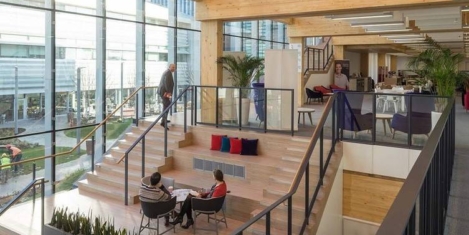To provide the best experiences, we use technologies like cookies to store and/or access device information. Consenting to these technologies will allow us to process data such as browsing behaviour or unique IDs on this site. Not consenting or withdrawing consent, may adversely affect certain features and functions.
The technical storage or access is strictly necessary for the legitimate purpose of enabling the use of a specific service explicitly requested by the subscriber or user, or for the sole purpose of carrying out the transmission of a communication over an electronic communications network.
The technical storage or access is necessary for the legitimate purpose of storing preferences that are not requested by the subscriber or user.
The technical storage or access that is used exclusively for statistical purposes.
The technical storage or access that is used exclusively for anonymous statistical purposes. Without a subpoena, voluntary compliance on the part of your Internet Service Provider, or additional records from a third party, information stored or retrieved for this purpose alone cannot usually be used to identify you.
The technical storage or access is required to create user profiles to send advertising, or to track the user on a website or across several websites for similar marketing purposes.
 Lack of support for maternity returners among UK businesses has been uncovered in a new survey of professional, mainly management-level women. More than four fifths of pregnant women begin their maternity leave unhappy and lacking in confidence about work – and over a third feel so isolated when they return that they want to hand their notice in. MMB, a working parents’ website, surveyed more than 1,000 mothers, 72 percent of whom were in jobs at management level or above.
Lack of support for maternity returners among UK businesses has been uncovered in a new survey of professional, mainly management-level women. More than four fifths of pregnant women begin their maternity leave unhappy and lacking in confidence about work – and over a third feel so isolated when they return that they want to hand their notice in. MMB, a working parents’ website, surveyed more than 1,000 mothers, 72 percent of whom were in jobs at management level or above.










 The new northern home of the BBC is giving London a run for its money when it comes to siting offices for the UK’s top tech talent, with Manchester leading the way, according to
The new northern home of the BBC is giving London a run for its money when it comes to siting offices for the UK’s top tech talent, with Manchester leading the way, according to 
 Work/life balance, and the ability to take more annual leave, is the top priority for most European workers and 52 percent explicitly see this as an incentive for choosing certain benefits claims research from SD Worx. Employees in France (63 percent) prioritise this the most across the Europe, next is the UK, whilst workers in Austria (36 percent) and the Netherlands (32 percent) are least likely to opt for additional annual leave. Flexible working also plays a significant role in the benefits employees would choose, with home working allowances being a key factor for 21 percent of respondents and 21 percent wanting a laptop or smartphone included in their benefits package.
Work/life balance, and the ability to take more annual leave, is the top priority for most European workers and 52 percent explicitly see this as an incentive for choosing certain benefits claims research from SD Worx. Employees in France (63 percent) prioritise this the most across the Europe, next is the UK, whilst workers in Austria (36 percent) and the Netherlands (32 percent) are least likely to opt for additional annual leave. Flexible working also plays a significant role in the benefits employees would choose, with home working allowances being a key factor for 21 percent of respondents and 21 percent wanting a laptop or smartphone included in their benefits package. 




 The majority of employees (77 percent) agree that people should take proactive steps to manage their mental health a new survey has revealed. Of those surveyed, the vast majority felt that there is increased awareness about mental health (87 percent) and that people are more willing to talk openly about mental health issues than they were a few years ago (82 percent). The impact of high-profile people speaking out about their own mental health challenges was believed to be the biggest influencing factor, cited by more than half (53 percent) of respondents.
The majority of employees (77 percent) agree that people should take proactive steps to manage their mental health a new survey has revealed. Of those surveyed, the vast majority felt that there is increased awareness about mental health (87 percent) and that people are more willing to talk openly about mental health issues than they were a few years ago (82 percent). The impact of high-profile people speaking out about their own mental health challenges was believed to be the biggest influencing factor, cited by more than half (53 percent) of respondents. 


 Employee motivation levels appear to be the decline, with 29 percent of employees surveyed saying they were not motivated at work in 2017 compared to just 18 percent who said the same in 2016 the research report, “Living to Work” has claimed. Motivates Inc. has commissioned its employee motivation research for the past three years, surveying over 2,000 UK employees in full-time employment. The full data shows like-for-like how employees are feeling in the workplace and what hygiene factors have affected behaviours year-on-year. According to the latest data 71 percent of UK employees were motivated in 2017, which on its own shows a positive result, yet when you look at the motivational statistics from 2016 the data actually shows the percentage of motivated employees has dropped by 11 percent in just one year. That’s 220 more employees in an organisation of 2,000 who are not feeling good about their job.
Employee motivation levels appear to be the decline, with 29 percent of employees surveyed saying they were not motivated at work in 2017 compared to just 18 percent who said the same in 2016 the research report, “Living to Work” has claimed. Motivates Inc. has commissioned its employee motivation research for the past three years, surveying over 2,000 UK employees in full-time employment. The full data shows like-for-like how employees are feeling in the workplace and what hygiene factors have affected behaviours year-on-year. According to the latest data 71 percent of UK employees were motivated in 2017, which on its own shows a positive result, yet when you look at the motivational statistics from 2016 the data actually shows the percentage of motivated employees has dropped by 11 percent in just one year. That’s 220 more employees in an organisation of 2,000 who are not feeling good about their job.







October 31, 2018
What is in a name for the UK facilities management sector?
by Jo Sutherland • Comment, Facilities management
(more…)